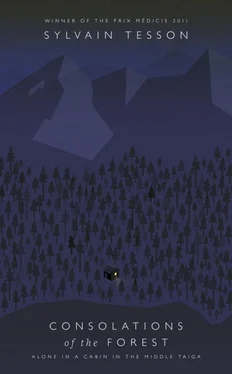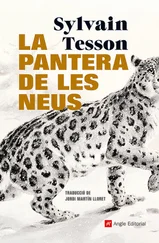A troop of drunken men, military weaponry, vodka, big vehicles and technology: a recipe for death. Yura watches the goings-on with weary resignation. A malignant energy is gathering in the bay; all Russia is here in miniature: the dangerous overlords, the faithful Tolstoyan servant, Sergei the woodsman. And the humble attendants, knowing what profit they will reap from hanging around the powerful, swallow their disgust. This country in which the bonds of vassalage still survive was the laboratory of communism. I long for one thing only: to get back to my desert.
V.M. offers to drive me home in his Mercedes. I climb into the enormous car with Sergei and two other Russians, one of whom falls instantly asleep, while the other shouts into a walkie-talkie for three minutes before realizing that the thing is dead. The radio spits out a rap song. Sergei doesn’t say a word. Some patronage comes at a heavy cost.
We are now having a drink at my place. Pointing to the window, V.M. says: ‘I lived in the USA for a year; I don’t like the Americans’ mentality. This is what I want: liberty, anarchy, the lake.’ We have more drinks. In the end, these guys are touching. They’ve got the mugs of fellows who’d tear Chechens limb from limb, and they delicately share their crackers with the tit. They and I are staying by this lake for the same reason, but in different ways. When they leave, I can breathe again. They have turned on the emergency light on the roof of the Mercedes, in case they hit a traffic jam.
Silence comes back to me, the immense silence that is not the absence of sound but the disappearance of any interlocutor. I feel love welling inside me for these woods harbouring deer, this lake gorged with fish, this sky crisscrossed by birds, and the intensity of my great beatnik love is proportional to the increasing distance between V.M.’s gang and my cabin. As they disappear, so does everything I fear: noise, the herd mentality, the urge to hunt – in short, the fever of the human mob.
I’m drunk and I need water. In the ten days I’ve been gone, my water holes have frozen over. I attack the lake with the ice axe, spending an hour and a half chopping out a handsome basin a yard wide and four feet deep. Water gushes up suddenly, and I dip into it with pleasure. This feeling of having earned one’s water. My arm muscles ache. Once upon a time, in the fields and forests, living kept us in shape.
16 MARCH
In the world I left, the presence of others has some control over our actions, and maintains discipline. In the city, when shielded from the eyes of our neighbours, we behave less elegantly. Who has never eaten alone, standing in the kitchen, happy not to have to set the table, eagerly devouring a tin of cold ravioli? In a cabin, standards are always at risk of slipping. How many solitary Siberians, delivered from all social imperatives, knowing that there is no one to judge them, wind up flopped on a bed of cigarette butts, scratching their rashes? Crusoe was aware of this danger and decided, so as not to debase himself, to have supper every evening at a table and properly dressed, as if he had invited a guest.
Our fellow men confirm the reality of the world. If you close your eyes in the city, what a relief it is that reality doesn’t erase itself: others can still perceive it! The hermit is alone in the face of nature. As the sole consciousness contemplating reality, he bears the burden of the representation of the world, its revelation before the human gaze.
Boredom doesn’t frighten me in the least. There are worse pangs: the sorrow of not sharing with a loved one the beauty of lived moments. Solitude: what others miss out on by not being with the person who experiences it.
In Paris, I was warned before I left. Boredom would be my deadly enemy! I’d die of it! I listened politely. People who said such things assumed that they themselves were a superb form of entertainment. ‘Reduced to myself alone, I feed, it is true, on my own substance, but it does not run out…’ writes Rousseau in the Reveries.
Rousseau becomes aware of the challenge and ordeal of loneliness in the Fifth Walk. The solitary man must strictly devote himself to virtue, he says, and must never indulge in cruelty. If he behaves badly, the experience of his hermit’s way of life will impose a double penance on him: on the one hand, he will have to endure an atmosphere corrupted by his own baseness, and on the other, he’ll be forced to admit his own failure as a human being. In opposition to the natural man stands the civil man: ‘The civil man desires the approval of others; the solitary man must of necessity be content with himself, or his life is unbearable. And so the latter is forced to be virtuous.’ Rousseau’s solitude generates goodness, and through a feedback effect, it will dissolve the memory of human wickedness. Solitude is the balm applied to the wound caused by the distrust of one’s fellow men: ‘I would rather flee them than hate them,’ he writes in the Sixth Walk.
It is in the interest of the solitary man to treat his surroundings well, to rally to his cause all animals, plants and gods. Why should he increase the austerity of his state with the hostility of the world? The hermit refuses to brutalize his environment. It’s the ‘Saint Francis of Assisi syndrome’. The saint speaks to his brothers the birds, Buddha soothes the mad elephant with a gentle pat, Saint Seraphim feeds the bears, and Rousseau seeks consolation by botanizing.
At noon, I study the snow falling on the cedars. I try to let the sight sink into me so that I can follow the paths of as many snowflakes as possible. An exhausting exercise. And some people call this laziness!
This evening, the snow is still falling. Watching it, the Buddhist says, ‘Let’s not expect any change’; the Christian, ‘Tomorrow will be better’; the pagan, ‘What does all this mean?’; the Stoic, ‘We’ll see what happens’; the nihilist, ‘Let it bury everything’; and I say, ‘I’ll have to cut some wood before the woodpile gets snowed under.’ Then I put another log in the stove and go to bed.
17 MARCH
Questions to clarify over the coming months:
Will I be able to stand myself?
Will I, at the age of thirty-seven, be able to change?
Why don’t I miss anything I left behind?
The sky is still churning out snow. A morning at the window. In a cabin, life revolves around three activities:
1. The surveillance and profound understanding of one’s field of vision (determined by the window frame). Nothing must go unnoticed.
2. Good housekeeping.
3. The welcoming of rare visitors, entertainment, the giving of directions, and sometimes, on the contrary, the barring of the door to pests.
If I wanted to flatter myself, I’d say that these tasks make me something of a sentinel and my cabin a lookout post for the empire of trees. Actually, I’m a concierge and the cabin is my loge. Next time I head off to the woods, perhaps I’ll hang out a sign that says Back soon .
Towards evening, the slanting sunlight gives the snow a steely glint. The flat white tints now gleam like mercury. I try to take a photo of this phenomenon but the image catches nothing of its brilliance. The vanity of photos. The frame reduces the real to its Euclidian value, killing the substance of things, compressing their flesh. Reality gets squashed against the screen. A world obsessed with images can’t taste the mysterious emanations of life. No photographic lens will capture the memories unfolded by a landscape in our hearts. And what a face sends us in the way of negative ions or impalpable invitations – what camera could show them to us?
18 MARCH
My provisions are getting low. I have to figure out a way to fish. At Baikal the Siberians use a simple method: they dump a handful of what they call bormash , living water fleas collected in the marshes, through a hole in the ice. Attracted by this manna, fish gather at the hole, and the fisherman need only toss in his line. Having neither marshes nor bormash at hand, I borrow an old technique from the foresters: cutting quite a large hole in the ice fairly close to shore, where the lake is nine feet deep, I pile in cut cedar boughs and leave them to soak. In a few days, thousands of tiny organisms will have collected around the needles, ready to be harvested and used for bait.
Читать дальше












